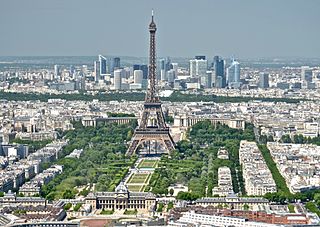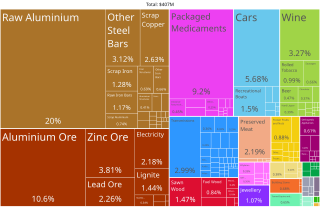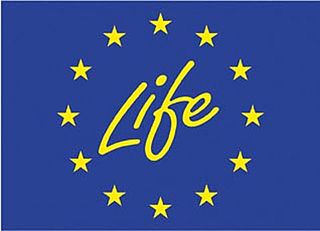
The economy of Austria is a developed social market economy, with the country being one of the fourteen richest in the world in terms of GDP per capita. Until the 1980s, many of Austria's largest industry firms were nationalised. In recent years, privatisation has reduced state holdings to a level comparable to other European economies.

The Common Agricultural Policy (CAP) is the agricultural policy of the European Union. It implements a system of agricultural subsidies and other programmes. It was introduced in 1962 and has since then underwent several changes to reduce the EEC budget cost and consider rural development in its aims. It has however, been criticised on the grounds of its cost, its environmental, and humanitarian effects.

The Common Fisheries Policy (CFP) is the fisheries policy of the European Union (EU). It sets quotas for which member states are allowed to catch each type of fish, as well as encouraging the fishing industry by various market interventions. In 2004 it had a budget of €931 million, approximately 0.75% of the EU budget.
England Rural Development Programme is the instrument by which the UK Department for Environment, Food and Rural Affairs (Defra) fulfills its rural development obligations in England, as set out by the European Union. It is derived primarily from Council Regulation European Union Regulation No. 1257/1999 and the related successive implementing Commission Regulations.

The economy of the European Union is the joint economy of the member states of the European Union (EU). It is the third largest economy in the world in nominal terms, after the United States and China, and the third one in purchasing power parity (PPP) terms, after China and the United States. The European Union's GDP estimated to be around $16.6 trillion (nominal) in 2022 representing around one sixth of the global economy. Germany has by far the biggest national GDP of all EU countries, followed by France and Italy.
The European Agricultural Guarantee Fund (EAGF) consumes a large part of the general budget of the European Union. It finances direct payments to farmers under the Common Agricultural Policy (CAP), as well as measures to regulate the common markets such as intervention and export refunds under both the CAP and the Common Fisheries Policy (CFP).

The regional policy of the European Union (EU), also referred as Cohesion Policy, is a policy with the stated aim of improving the economic well-being of regions in the European Union and also to avoid regional disparities. More than one third of the EU's budget is devoted to this policy, which aims to remove economic, social and territorial disparities across the EU, restructure declining industrial areas and diversify rural areas which have declining agriculture. In doing so, EU regional policy is geared towards making regions more competitive, fostering economic growth and creating new jobs. The policy also has a role to play in wider challenges for the future, including climate change, energy supply and globalisation.

The European Structural and Investment Funds are financial tools governed by a common rulebook, set up to implement the regional policy of the European Union, as well as the structural policy pillars of the Common Agricultural Policy and the Common Fisheries Policy. They aim to reduce regional disparities in income, wealth and opportunities. Europe's poorer regions receive most of the support, but all European regions are eligible for funding under the policy's various funds and programmes. The current framework is set for a period of seven years, from 2021 to 2027.
The Committee on Agriculture and Rural Development (AGRI) is a committee of the European Parliament.

The Multiannual Financial Framework (MFF) of the European Union, also called the financial perspective, is a seven-year framework regulating its annual budget. It is laid down in a unanimously adopted Council Regulation with the consent of the European Parliament. The financial framework sets the maximum amount of spendings in the EU budget each year for broad policy areas ("headings") and fixes an overall annual ceiling on payment and commitment appropriations.

The budget of the European Union is used to finance EU funding programmes and other expenditure at the European level.
The Framework Programmes for Research and Technological Development, also called Framework Programmes or abbreviated FP1 to FP9, are funding programmes created by the European Union/European Commission to support and foster research in the European Research Area (ERA). Starting in 2014, the funding programmes were named Horizon.

The economy of Montenegro is currently in a process of transition, as it navigates the impacts of the Yugoslav Wars, the decline of industry following the dissolution of the Yugoslavia, and economic sanctions imposed by the United Nations. Montenegro joined the World Trade Organization on 29 April 2012. Montenegro joined the North Atlantic Treaty Organization on 5 June 2017. The accession of Montenegro to the European Union is planned for 2025.
SAPARD (Special Accession Programme for Agriculture and Rural Development) was a financial assistance program established in June 1999 by the Council of the European Union to help countries of Central and Eastern Europe deal with the problems of the structural adjustment in their agricultural sectors and rural areas, as well as in the implementation of the acquis communautaire concerning the Common Agricultural Policy (CAP) and related legislation.

The Directorate-General for International Partnerships is the European Commission department responsible for international development policy. It operates under the authority of the European Commissioner for International Partnerships, Jutta Urpilainen.
The European Union Space Programme is an EU funding programme established in 2021 along with its managing agency, the European Union Agency for the Space Programme, in order to implement the pre-existing European Space Policy established on 22 May 2007 when a joint and concomitant meeting at the ministerial level of the Council of the European Union and the Council of the European Space Agency, known collectively as the European Space Council, adopted a Resolution on the European Space Policy. The policy had been jointly drafted by the European Commission and the Director General of the European Space Agency. This was the first common political framework for space activities established by the European Union (EU).

The LIFE programme is the European Union's funding instrument for the environment and climate action. The general objective of LIFE is to contribute to the implementation, updating and development of EU environmental and climate policy and legislation by co-financing projects with European added value. LIFE began in 1992 and to date there have been five phases of the programme. During this period, LIFE has co-financed some 4600 projects across the EU, with a total contribution of approximately 6.5 billion Euros to the protection of the environment and of climate. For the next phase of the programme (2021–2027) the European Commission proposed to raise the budget to 5.45 billion Euro.

European Union–Pakistan relations are the international relations between the common foreign policy and trade relations of the European Union and the Islamic Republic of Pakistan.

The European Union (EU) Environmental Policy was initiated in 1973 with the "Environmental Action Programme" at which point the Environmental Unit was formed. The policy has thereafter evolved "to cover a vast landscape of different topics enacted over many decades" (Reuters) and in 2015 the Institute for European Environmental Policy estimated that "the body of EU environmental law" amounted to 500+ directives, regulations and decisions.
"Over the past decades the European Union has put in place a broad range of environmental legislation. As a result, air, water and soil pollution has significantly been reduced. Chemicals legislation has been modernised and the use of many toxic or hazardous substances has been restricted. Today, EU citizens enjoy some of the best water quality in the world"

The community-led local development (CLLD) funding approach, initially limited to the rural areas under the name LEADER, is a European Union initiative to support development projects primarily in rural, but also in coastal and urban areas of EU member countries at the local scale by involving relevant local actors, including local organizations and associations, as well as individual citizens. The approach is regularly evaluated, and also discussed widely in academic literature on local economic and social development.








